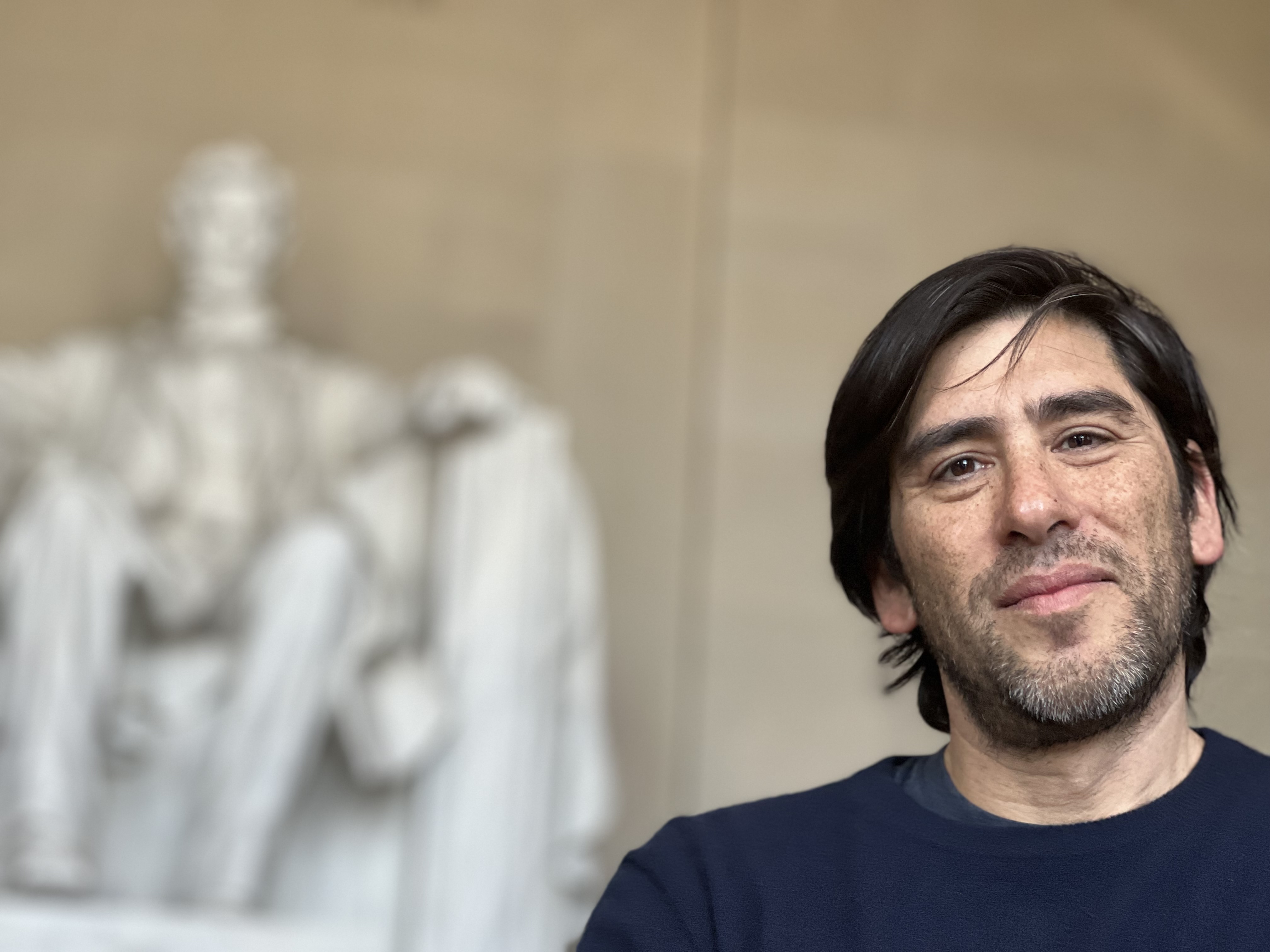Education
- Ph.D. in Economics. University of California, Los Angeles. May, 2005.
- M.A. in Economics. Universidad de San Andrés (Argentina). August, 1998.
- Lic. in Economics. Universidad de Buenos Aires (Argentina). April, 1998.
Academic Positions
- Professor of Politics, Princeton University. Jul. 2020 - Present
- Director, Research Program in Political Economy. Jul 2018 - Present.
- Research Associate, Political Economy Program, NBER. Apr. 2021 - Present.
- Associate Professor of Politics, Princeton University. Jul. 2015 - July 2020.
- Assistant Professor of Politics, Princeton University. Jul. 2010 - Jul. 2015.
- Assistant Professor of Economics, California Institute of Technology. Jul. 2005 - Jul. 2010.
Work in Progress
- "Reputation in Committees: The Case of the FOMC", with Gabriel Lopez Moctezuma and Paola Moscariello.
- "Money and Votes in Electoral Competition", with Ted Enamorado and Gabriel Lopez Moctezuma.
Selected Working Papers
- "Innovation Adoption by Committee: An Empirical Analysis of Deliberations in FDA Advisory Committees", with Nathan Canen.
We study the process of collective learning and voting in FDA advisory committees, using data from transcripts of all meetings conducted between 2007 and 2020. To do this, we structurally estimate a dynamic model in which committee members with heterogeneous preferences and priors hear evidence presented to them, and strategically decide when to stop gathering information and vote. We use our estimates to quantify the probability of correct recommendations by the advisory panels, and compute counterfactual policy experiments to evaluate institutional changes to the decision-making process ruling approval of new products by the FDA.
- "Collaboration Between and Within Groups", with Santiago Oliveros and Parth Parihar. R&R, Theoretical Economics.
We study the ability of multi-group teams to undertake binary projects in a decentralized environment. The equilibrium outcomes of our model display familiar features in collaborative settings, including inefficient gradualism, inaction, and contribution cycles, wherein groups alternate taking responsibility for moving the project forward. Expected delay grows more than proportionally with project size, and some welfare-enhancing projects are not completed, even as agents become arbitrarily patient. A team composed of two equally large groups can complete larger projects than a fully homogenous team, even as the difference in preferences for completion among the two groups is arbitrarily small. Moreover, if the project is sufficiently large, the two-group team always completes the project strictly faster.
- "Representation Failure", with Galileu Kim and Sergio Montero. Under Review.
We use a rich dataset on thousands of candidates for office in three elections for Brazil's Chamber of Deputies to quantify the extent to which the "supply side" of politics limits voter welfare, and explore how and why this happens. We (i) quanitfy the relative value that voters give to candidates' policy and valence, (ii) evaluate the welfare loss to voters brought by the set of candidates they face, and their (equilibrium) policy choices, and (iii) explain when and why candidates choose policy positions that diverge from voters' preferences.
- "Beyond Delegation: Agency Discretion when Budgets Matter", with Nemanja Antic. R&R, Journal of Politics.
A fundamental results in the literature on congressional control is that optimal institutions take the form of limited delegation of decision-making authority to the agency. We revisit the question of optimal institutional design when the legislature and the agency care about both policy and its scale of implementation. If the agency has a conservative bias, the legislature overfunds relatively liberal policies and underfunds relatively conservative policies. We show that in this context, delegation is not optimal. Significantly, policy is almost everywhere more liberal than the agent's preferred policy. The regulatory framework is ex post inefficient for all realizations of the agency's private information. In particular, for realizations of the state calling for relatively conservative policies, policy is more liberal, and the budget allocated to it is lower, than what both the legislature and the agency would want to impose if they had full information.
Selected Publications & Forthcoming
-
"Career Concerns and the Dynamics of Electoral Accountability", with Gabriel Lopez Moctezuma and Adam Meirowitz (Appendix). American Journal of Political Science, Vol. 68, No. 2, April 2024, Pp. 696–713.
We estimate office and policy motivations in the US Senate. Senators are generally willing to make large policy concessions for electoral gains, but electoral accountability is low due to the small impact of policy changes on voter support.
- "Collective Hold-Up", with Santiago Oliveros. Theoretical Economics, Vol. 18, 2023, pp. 1063-1100. [Slides]
We consider a dynamic process of coalition formation in which a principal bargains sequentially with a group of agents. We show that increasing agents' bargaining power can induce delay and be detrimental to their welfare. This occurs in spite of the lack of informational asymmetries or discriminatory offers.
-
"Can Words Get in the Way? The Effect of Deliberation in Collective Decision-Making", with Xiaoxia Shi and Matt Shum. Online Appendix. Journal of Political Economy, Vol. 126, No.2, 2018, pp. 688-734.
We estimate a model of voting with incomplete information in which committee members (judges in the US courts of appeals) can communicate before voting. We compare the probability of mistakes with deliberation with a counterfactual of no communication. We find that deliberation can be useful when judges tend to disagree ex ante and their private information is relatively imprecise; otherwise, it tends to reduce the effectiveness of the court.
-
"Competing for Loyalty: The Dynamics of Rallying Support", with Santiago Oliveros. American Economic Review, Vol.107, No.10, October 2017, pp.2990-3005. Online Appendix. Slides.
We consider a class of dynamic collective action problems in which a principal uses transfers to rally the support of a group of agents, in a context in which agents decisions are sequential and irreversible. We show that whenever the principals provide value to the members of the group, introducing competition from a second principal reduces agents' welfare.
- "Power Brokers: Middlemen in Legislative Bargaining", with Santiago Oliveros. Journal of Economic Theory, Vol. 162, March 2016, pp. 209-236. Online Appendix. [Slides]
We consider a model of decentralized bargaining in legislatures. We show that some parties can endogenously emerge as brokers in equilibrium, transferring resources and voting rights between two parties that wouldn't negotiate directly with one another.
-
"More than Politics: Ability and Ideology in the British Appellate Committee", with Gabriel Katz. Journal of Law, Economics & Organization, Vol. 32 (1), 2016, pp. 61-93. Online Appendix.
We show that a model of judicial behavior that accounts for differences in ability and ideology among justices explains the decisions of the UK Lords of Appeal remarkably well, and improves the fit of the ideological model.
-
"What does it Take for Congress to Enact Good Policies? Unpacking Institutions and Electoral Concerns", with Gabriel Katz. Economics & Politics, Vol 28 (1), March 2016, pp. 79-104. Online Appendix.
We estimate an empirical model of voting in Congress that accounts for uncertainty and private information about the quality of the proposal. We show that seniority and uncompetitive elections lead to higher ideological rigidity and curtail the role of information in policy-making.
- "Voting in the Bicameral Congress: Large Majorities as a Signal of Quality", with Gabriel Katz and Sebastian Saiegh. Journal of Law, Economics & Organization, Vol. 29, No. 5, Oct 2013, pp. 957-991. (Winner of the 2013 Oliver E. Williamson prize for the best article in Law, Economics and Organization). Supp.Material Appendix.
We estimate a model of voting in Congress that allows for dispersed information about the quality of proposals. The results highlight the effects of bicameralism on policy outcomes. In equilibrium, the Senate imposes an endogenous supermajority rule of about four-fifths on members of the House.
- "On the Nature of Competition in Alternative Electoral Systems", with Andrea Mattozzi. Journal of Politics, Vol. 75, No. 3, July 2013, pp. 743-756. Online Appendix.
We consider a model of electoral competition with free entry, ideological differentiation and campaign spending. We show that proportional elections induce more candidates, competing less aggressively in campaign spending, than majoritarian elections.
- "To Elect or to Appoint? Bias, Information, and Responsiveness of Bureaucrats and Politicians", with Garret Lewis and Matt Shum. Journal of Public Economics, Vol. 97, Jan 2013, pp. 230-244. Slides.
Justices that are shielded from voters' influence on average (i) have better information, (ii) are more likely to change their preconceived opinions about a case, and (iii) make less mistakes than their elected counterparts.
- "The Value of Information in the Court. Get it Right, Get it Tight", with Matt Shum. American Economic Review, Vol. 102, No. 1, Feb. 2012 , pp. 202-237(36).
We estimate an equilibrium model of decision-making in the Court that takes into account both private information and ideological differences between justices. We find that in roughly one out of two cases, justices' prior beliefs and ideological biases are overpowered by case-specific information.
- "The Pro-Competitive Effect of Campaign Limits in Non-Majoritarian Elections", with Andrea Mattozzi. Economic Theory, Vol. 49, No. 3, Mar. 2012, pp. 591-619. Working Paper version w/Additional Results.
Spending caps and compulsory voting can be pro-competitive in non-majoritarian electoral systems, leading to a larger number of parties contesting the election.
- "Contestable Leadership: Party Leaders as Principals and Agents". Quarterly Journal of Political Science, Vol. 3, No.3, October 2008, pp 203-225. Working Paper version with additional results. [Slides]
Party discipline is endogenously determined by backbenchers' beliefs about the extent of support to the leader within the party. We show that rewards that can be distributed publicly and on the spot (as opposed to promises of future benefits) are necessary for the leader to be powerful.
- "Judicial Lobbying: The Politics of Labor Law Constitutional Interpretation", with Pablo T. Spillerand Mariano Tommasi. American Political Science Review, vol. 100, No. 1, Feb. 2006, Pp. 85-97.
We provide conditions for judicial decisions to be sensitive to legislative lobbying, and find that lobbying falls the more divided the legislature is on the relevant issues. We apply this framework to analyze supreme court labor decisions in Argentina.
- "Judicial Independence in Unstable Environments", with Pablo T. Spiller and Mariano Tommasi. American Journal of Political Science, Vol.46, No.4., Oct.2002, pp. 699-716.
We examine the independence of Argentina's Supreme Court. We show that the probability of voting against the government increases the less aligned a justice is with the President, and falls the stronger the control of the President over the legislature.
Other Working Papers
We consider strategic voting in sequential committees in a common value setting with incomplete information.
Matias Iaryczower is a Professor of Politics at Princeton University, and Director of the Research Program in Political Economy. He received his Ph.D in Economics from UCLA in 2005, and was Assistant Professor of Economics at the California Institute of Technology 2005-10. His research uses game theory and empirical methods to study how institutions and strategic considerations shape collective decision-making in courts, legislatures, and elections.


Coauthors
Current Students
- Elayne Yao (main advisor): Comparative Politics / Formal Theory & Quantitative Methods.
- Yuhan Zheng (main advisor): Formal Theory & Quantitative Methods.
- Joe Ruggiero (com.member): International Relations / Formal and Quantitative Methods.
- Roel Bos (com.member): American Politics / Formal Theory.
Former Students (Princeton)
- Andrew Mack (main advisor): Political Economy. Postdoc @ Stanford.
- Korhan Kocak (main advisor): Political Economy. Assistant Professor @ NYU Abu Dhabi.
- Gabriel Lopez Moctezuma (main advisor): Political Economy / Quantitative Methods. Assistant Professor @ Caltech.
- Parth Parihar (com.member): Economics / Political Economy. Postdoc @ EUI.
- Noam Reich (com. member): International Relations. Postdoc @ NYU Abu Dhabi.
- Dan Gibbs (com. member): American Politics, Formal Theory. Assistant Professor @ Virginia Tech.
- Galileu Kim (com. member): Comparative Politics. Researcher @ World Bank.
- Brendan Cooley (com. member): International Relations, Formal and Quantitative Methods. Senior Data Scientist @ Big League Advance.
- Sondre Solstad (com. member): Comparative Politics. Senior Data Journalist @ The Economist.
- Ted Enamorado (com. member): Quantitative Methods / Comparative Politics. Assistant Professor @ Washington University Saint Louis.
- Amanda Kennard (com. member): International Relations. Assistant Professor @ Stanford.
- Romain Ferrali (com. member): Political Economy. Assistant Professor @ Aix-Marseille School of Economics.
- Peter Buisseret (com. member): Formal Theory, Comparative Politics. Assistant Professor @ Harvard.
- Jidong Chen (com. member): Formal Theory / Comparative Politics. Associate Professor @ Tsinghua U (China)

